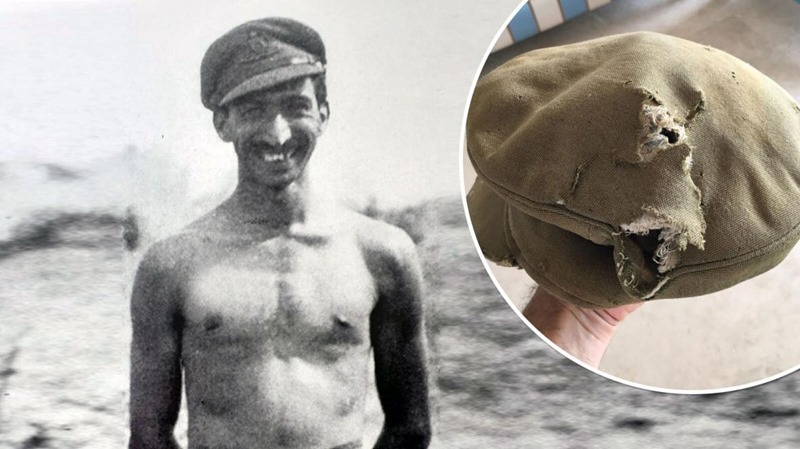Brigadier Furdoon “Duck” Mehta, the Royal Indian Artillery officer who survived a bullet passing through his cap and later became military attache in Washington, has passed away on his 101st birthday on March3.
Cut to March 1944: flying a single-seater Auster over the Bm1nese jungle while directing artillery fire, Captain “Duck” Mehta always had to dodge the flak and the bullets. Having taken off before dawn one morning to locate Japanese gm1 positions in the Shan Hills, and seeing nothing, he had descended to 300ft when there was a loud crack. Something hit his head and spun it rom1d, and the cockpit was sprayed with red liquid.
A ground observer urged him on the radio to gain height, as the whole Japanese position had opened fire on him. He managed to land at a nearby strip, where an ambulance driver told him his aircraft had “taken a terrible battering”.
The Auster was punctured with bullet holes and one of the main wing spars was fi·ac tm·ed. Mehta’s left shoulder was wet and red, yet he felt no pain. A bullet had come through the right side of the cockpit, ricocheted into the first aid box and broken the Mercurochrome bottle.
The driver asked about his service-dress cap, which looked like a fusilier’s with its white plune sticking up. Mehta was dismayed to discover the bullet had gone through it, taking with it the lining and some of his hair. It had been a very pukka cap.
The Royal Regiment of Indian Artillery had its origins in 1827, when a battery was raised in Bombay for the East India Company’s army of the Bombay presidency. The other two presidencies, Madras and Bengal, soon followed suit.
After the Indian Mutiny in 1857, despite the trouble being confined almost entirely to Bengal, all native artillery units were disbanded except mountain batteries. The First World War reversed the policy and the Indian Artillery, led by both British and Indians, was rapidly expanded, serving in East Africa, West Asia and Gallipoli.
Trials in England in the 1930s for gm111er officers to fly light aircraft to control the guns led to the formation of “air observation post” squadrons, nominally RAF but with Royal Artillery officers doing the flying and commanding Number 656 (Air OP) Squadron was sent to India to join Lieutenant-General (later Field Marshal Sir)William Slim’s Fourteenth Army on the Burmese border. Mehta was the only Indian officer to serve with the squadron.
Furdoon Siavax Behramji Mehta was born in 1920 into a devout Parsee family in Bombay. His father had studied medicine at Bombay, UCL and Edinburgh, and served as a surgeon captain in the Indian Medical Service in the First World War.
After schooling locally, in 1934 Furdoon Mehta joined the Mercantile Marine Training Ship Dufferin for two years, before going to the Indian Military Academy at Dehradun. He was commissioned into the Royal Indian Artillery in 1940, and two years later answered a call for volunteers to be Air OP pilots.
After initial flying training at RAF Jodhpur and Air OP training and conversion to the Auster at the newly established School of Artillery at Deolali, he joined 656Squadron.
Nicknames being derigueur for pilots, it was perhaps inevitable that coming from Bombay his would be “Duck”, which he bore with good humour and even some pride
He flew from both earth strips and aircraft carriers in the Gulf of Bengal until the Japanese surender, and then during the reoccupation of Malaya.
After the war Mehta came to England for the land-air warfare course at Old Sarum, Wiltshire, before attendingtl1e h1dian Army staff college at Quetta. On independence in 1947, aged 27, he took com mand of the 9th Parachute Field Regiment, a markedly accelerated promotion to lieu tenant colonel that no one in theh1dian artillery has beaten since.
He then served at army headquarters in Delhi before being appointed chief instructor at Dehradun, future recognition of his leadership qualities. He returned to Salisbury Plain in 1955 to attend the celebrated long gunnery course at the Royal School of Artillery, Larkhill, and then spent the following year on at the British Army of the Rhine.
Subsequently, he commanded the artillery at divisional, corps and many level, and during the India-Pakistan war of 1965 planned and directed the air defence of the field armies and vital points throughout much of northern India, including Delhi. The following year he went to Washington as military and naval attache with his wife, Villie, whom he had met on leave in Bombay six years earlier and proposed to within a week.
After leaving the army early, in 1969, he worked for many years for Tata Electric. Villie died in 2020. Mehta is survived by a son, Hormuz, who works in financial services, and a daughter, Zarina, who is a television producer and philanthropist.
“Duck” Mehta retained great affection for Britain and returned many times with his wife to attend reunions and meet old comrades. He wore a poppy on November 11 each year and always attended Remembrance commemorations, a living antidote to modern British self-abasement for its Indian past.
The Times, London
Article in the Indian Express by Man Aman Singh Chhina
Brigadier Furdoon Siavax Byramji Mehta: Pioneer of Indian Army Aviation Corps, not averse to risk
Named ‘Duck’ Mehta by his fellow officers after the fish Bombay Duck, the Brigadier who passed away in Mumbai on March 3, on his birthday, at the age of 101 years, had many firsts to his credit.
Brigadier Mehta (centre) was nicknamed ‘Duck’ by fellow officers after the fish Bombay Duck, because he came from Bombay. (Express Photo)
Not many would be able to keep their head and keep maneuvering an aircraft especially after an enemy bullet slices through their cap, taking with it a chunk of hair. For Brigadier Furdoon Siavax Byramji Mehta (retd), however, it was just another day at the front during the Second World War and something that couldn’t deter him from flying into enemy territory again.
Named ‘Duck’ Mehta by his fellow officers after the fish Bombay Duck, the Brigadier who passed away in Mumbai on March 3, on his birthday, at the age of 101 years, had many firsts to his credit.
He was the first Indian Artillery officer to wear the wings of the Air Observation Post (Air OP), now known as Army Aviation Corps. He was the only Indian Artillery officer to have served with the 656 Air OP Squadron of Royal Air Force (RAF) in Burma and Malaya in Second World War. He was also the first Indian Commanding Officer of 9 Parachute Field Regiment, a command which he took over in 1947 at the age of just 27 years.
Born on March 3, 1920, Mehta joined the Indian Military Academy in 1938 and graduated in April 1940. He was commissioned in the Regiment of Artillery and participated in the Second World War between 1942 to 1945, both in the traditional artillery role and in Air OP pilot’s role.
As a Captain, he trained as a pilot at the No 2 Elementary Flying and Training School (EFTS) at Jodhpur, which was established by then Maharaja of Jodhpur, Umaid Singh. Mehta was posted to the 656 Air Op Squadron RAF in Arakans, Burma, and later on the central front, which comprised Imphal plains in India.
Not averse to taking risks, it was in 1944 in Burma during the Second World War that Mehta narrowly escaped getting shot while flying too low on a recce to locate the position of Japanese soldiers. The bullets went through his cap, taking away a tuft of hair.
He also lost his way once, in February 1945, in the thick jungles trying to help an armoured regiment’s Colonel reconnoiter and risked crashing because he was flying without a compass. He decided to land an on airstrip, which still was still embedded with Japanese landmines marked with white crosses, because he needed fuel and a bearing to get back to an Advanced Landing Ground. Recounting the day in an article in the magazine ‘Freedom First’ some years ago, Brig Mehta said, “The Colonel asked me what the white crosses meant, so I said they were only mines and said I was going in for a landing. You should have seen his face!”.
Brig Mehta had a distinguished 29 year long career during which he also served as the Military Attache in Washington, USA from 1967 to 1969.
His military career saw him graduate from the Staff College in Quetta, now in Pakistan, in 1947, command a Parachute Field Artillery Regiment, becoming the Chief Instructor in Indian Military Academy in 1953, attending the Long Gunnery Staff Course (LGSC) at Larkhill Salisbury UK from 1955 to 1956, commanding 25 Artillery Brigade Rajouri in 1957 and 27 Artillery Brigade in Jalandhar in 1958, among other achievements.
The last wish of Brigadier FSB Mehta was that an Indian Army bugler should play ‘The Last Post’ at his funeral. A wish that was honoured by the Army’s Southern Command.
Wreaths were laid on behalf of the GOC-in-C Southern Command, GOC-in-C Maharashtra, Gujarat and Goa (MG&G) Area, Commanding Officer 9 Para Field Regiment and the Ex-Services Association Mumbai where he served as Vice Chairman for over 40 years.
Obituary by Malcolm Deboo, President ZTFE
RIP Brigadier Furdoon Siavax Byramji Mehta 3rd March 1920 – 3rd March 2021
Dear ZTFE Members & Well-wishers
We are all aware that the highest number of volunteers who served King Emperor and Great Britain during both world wars were from India, including many Zoroastrians. The legendary Brigadier Furdoon Siavax Mehta, who passed away on his 101st birthday on Wednesday 3rd March 2021 (Behram roj, Meher mah), was one of them! The distinguished soldier and devout Zoroastrian, was the first Indian Artillery officer to wear the wings of the Air Observation Post (Air OP). He was the only Indian Artillery officer to have served as a Captain with the RAF 656 Air OP Squadron in Burma and Malaya in WWII.
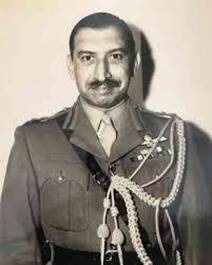 ‘Valiant Parsis in War and Peace’ written by the noted community historian Marzban J Giara has a write up on Brigadier Furdoon S B Mehta on page 150. Furdoon was born on 3rd March 2020 to Najoo and Major Dr Siavax Byramji Mehta IMS, both devout Zoroastrians. Dr Siavax Byramji Mehta, following his medical studies in Bombay, came to the UK for further studies at University College London and Edinburgh. Dr Mehta joined the IMS in 1916 and served a surgeon during WWI. Captain Dr Siavax Byramji Mehta was promoted to the rank of Major in 1926.
‘Valiant Parsis in War and Peace’ written by the noted community historian Marzban J Giara has a write up on Brigadier Furdoon S B Mehta on page 150. Furdoon was born on 3rd March 2020 to Najoo and Major Dr Siavax Byramji Mehta IMS, both devout Zoroastrians. Dr Siavax Byramji Mehta, following his medical studies in Bombay, came to the UK for further studies at University College London and Edinburgh. Dr Mehta joined the IMS in 1916 and served a surgeon during WWI. Captain Dr Siavax Byramji Mehta was promoted to the rank of Major in 1926.
After completing his schooling Furdoon joined the Indian Mercantile Training Ship ‘Dufferin’ in 1934. However,
he was not keen of taking a job with P&O, because he wanted to join the army like his father, but was underage. In 1936 he went to the famous Cambridge School at Dehra Dun, before joining the Military Academy in 1938 where he stood 7th out of 150, scoring full marks in his interview. On 3rd April 1940 Furdoon was commissioned in the Royal Regiment of Indian Artillery, which has its origins in 1827, and was posted to 11 Field Regiment RA at Meerut. In 1942 the Army asked for volunteers to join the Air Observation Post with the RAF. Captain Furdoon S B Mehta was the only Indian officer to volunteer Air OP. He was the first Indian Army aviator and flew from air strips on land and from aircraft carriers, thus had the honour of being the only Indian Triphibian during WWII, having served in all the 3 services; RN, Army and RAF.
In 1947, aged just 27 years and with a rapid promotion to Lieutenant Colonel, Furdoon S B Mehta became the first Indian Commanding Officer of 9 Parachute Field Regiment, a record that no one in the Indian artillery has beaten since. During the 1962 Indo Sino war, he served under the legendary Sam F Maneckshaw in NEFA. He served as the Military and Naval Attaché in Washington, USA from 1967 to 1969. Brigadier Furdoon S B Mehta left the
Army in 1969 after a distinguished 29 year long career. In civil life, he joined Cambata Aviation and became their Director Operations and then Tata Electric where he retired in 1980 aged 60 as the Manager Administration of all Tata Electric Companies. He also served for over 40 years as Vice Chairman of the Ex-Services Association Mumbai.
The anglophile Brigadier Mehta always wore a poppy every year on 11th November and
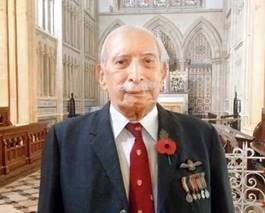 always attended the Remembrance commemorations. On Remembrance Sunday November 2013, aged 91, he was introduced to HRH Prince of Wales and the Duchess of Cornwall at the Remembrance Sunday Service at the Afghan Church, Mumbai. It was reported in Parsi Khabar on 1st December 2013, that Brigadier Mehta gave the address at the service on theme of moral courage. He told the congregation “moral courage implies quiet resolution” and the ability “to take risks, the will
always attended the Remembrance commemorations. On Remembrance Sunday November 2013, aged 91, he was introduced to HRH Prince of Wales and the Duchess of Cornwall at the Remembrance Sunday Service at the Afghan Church, Mumbai. It was reported in Parsi Khabar on 1st December 2013, that Brigadier Mehta gave the address at the service on theme of moral courage. He told the congregation “moral courage implies quiet resolution” and the ability “to take risks, the will
to take full responsibility for decisions, share rewards with subordinates and equally take blame when things go wrong”. https://parsikhabar.net/bombay/brigadier-furdoon-mehta- meets-with-prince-charles/7082/
A very interesting and affectionate obituary of Brigadier Mehta was written in The Times, Friday 12th March 2021 page 52, which we are sharing with you, tilted; “Brigadier Furdoon ‘Duck’ Mehta: Royal Indian Artillery officer who survived a bullet through his cap and later became military attaché in Washington”. For those who subscribe to The Times, the online link is; https://www.thetimes.co.uk/article/brigadier-furdoon-duck-mehta-obituary- pb0vmqf8n
The Indian Express also wrote an affectionate obituary of Brigadier Mehta, titled; “Brigadier Furdoon Siavax Byramji Mehta: Pioneer of Indian Army Aviation Corps, not averse to risk”. The online link is; https://indianexpress.com/article/india/pioneer-of-indian-army-aviation- corps-not-averse-to-risk-7226094/
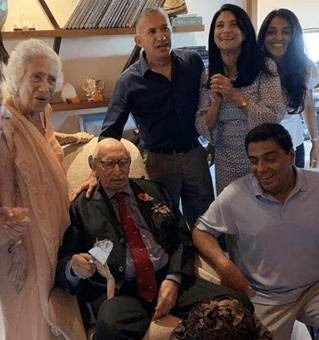 Furdoon met his soul mate Villie in Bombay in 1960 while on leave and proposed to her within a week after their initial meeting. They visited the UK several times, while he was in the army and after he retired to attend reunions with old comrades. In July 2019, at the age of 99, Brigadier Furdoon S B Mehta was felicitated by the Parachute Field Regiment for being one of the oldest WWII veterans. On 3rd March 2020 he
Furdoon met his soul mate Villie in Bombay in 1960 while on leave and proposed to her within a week after their initial meeting. They visited the UK several times, while he was in the army and after he retired to attend reunions with old comrades. In July 2019, at the age of 99, Brigadier Furdoon S B Mehta was felicitated by the Parachute Field Regiment for being one of the oldest WWII veterans. On 3rd March 2020 he
celebrated his 100th surrounded by his nonagenarian wife Villie, son Hormuz, daughter Zarina Ronnie Screwalla, family and friends. Villie sadly passed away later in 2020.
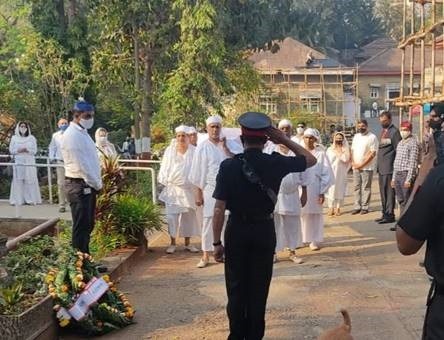 The funeral ceremony of the grand old man and well known aviator was performed on his 101st birthday at 3.45pm at the Hodiwala Bungli, Towers of Silence Mumbai. The last wish of Brigadier FSB Mehta was that an Indian Army bugler should play ‘The Last Post’ at his funeral, a wish that was honoured by the Army’s Southern Command.
The funeral ceremony of the grand old man and well known aviator was performed on his 101st birthday at 3.45pm at the Hodiwala Bungli, Towers of Silence Mumbai. The last wish of Brigadier FSB Mehta was that an Indian Army bugler should play ‘The Last Post’ at his funeral, a wish that was honoured by the Army’s Southern Command.
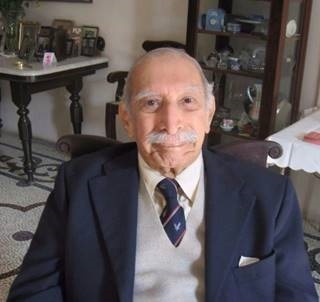 May Brigadier Furdoon Siavax Byramji Mehta’s soul rest in peace next to his beloved wife Villie, in Garothman. May his fravashi inspire us all to be courageous and voluntarily serve our country.
May Brigadier Furdoon Siavax Byramji Mehta’s soul rest in peace next to his beloved wife Villie, in Garothman. May his fravashi inspire us all to be courageous and voluntarily serve our country.
Kindly inform those who are not connected to the internet or / and do not receive ZTFE Group emails.
Yours sincerely Malcolm M Deboo ZTFE President

